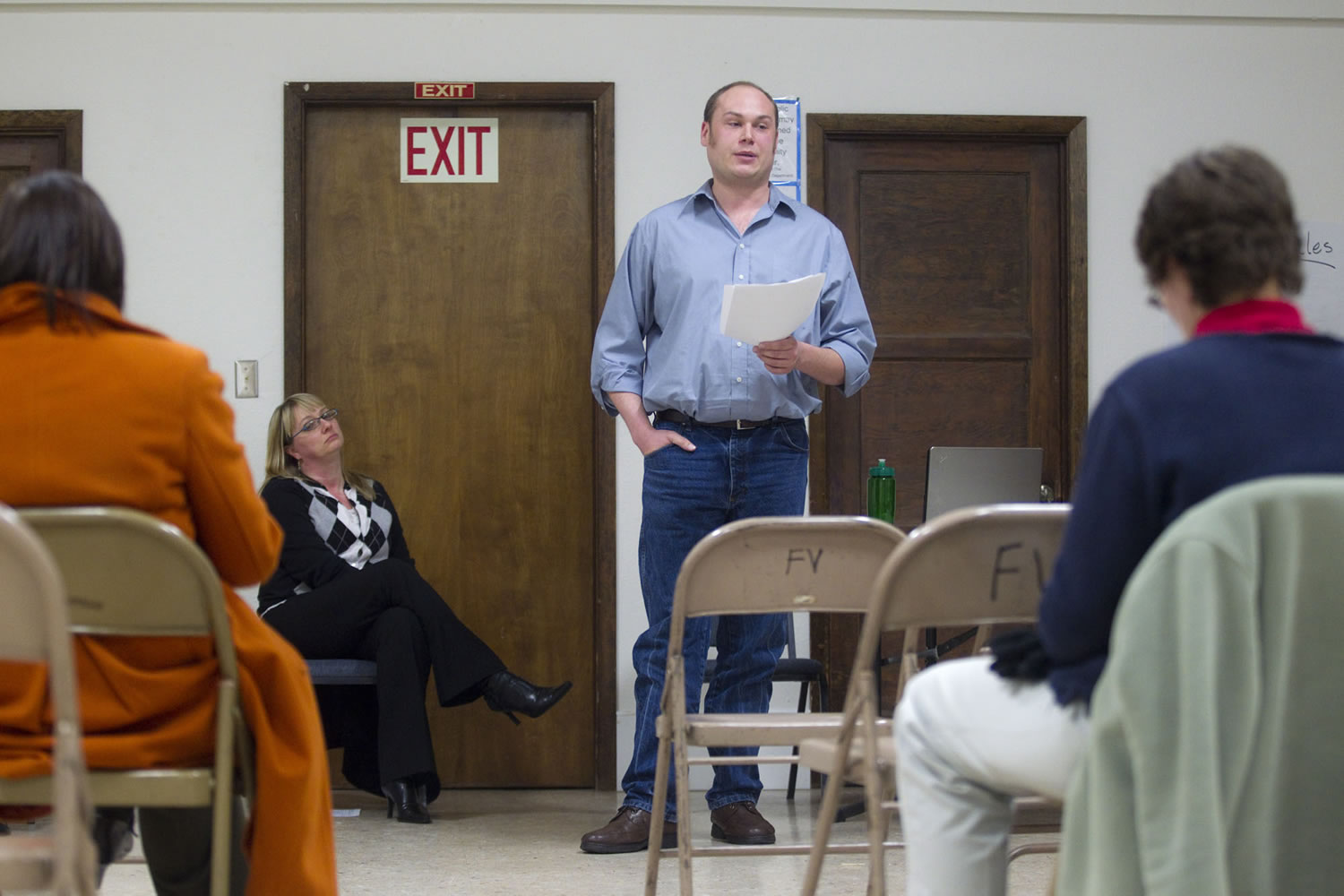Energy companies and environmental groups are drawing battle lines over the increase in oil-by-rail operations and proposals in the Northwest, including a plan by Tesoro Corp. and Savage Companies to handle as much as 380,000 barrels of crude per day at the Port of Vancouver.
But Vancouver’s Fruit Valley neighborhood, within walking distance of the proposed oil transfer terminal, hasn’t taken a position for or against the project. Instead, the group wants the project’s impacts thoroughly investigated and addressed. And the neighborhood’s search for answers from Tesoro and Savage continued Monday night at the Fruit Valley Community Center.
That’s where residents and company officials met for a pointed yet civil discussion of what would become the Northwest’s largest oil-handling facility.
About 17 people gathered for the two-hour meeting, which covered everything from oil-train safety and toxic air emissions to the project’s job creation and promise of energy security.
Eric LaBrant, president of the Fruit Valley Neighborhood Association, said Tesoro’s tarnished safety and environmental record should concern people. He cited the conclusions of a federal investigation into the explosion in 2010 that killed seven people at Tesoro’s petroleum refinery in Anacortes.
“A company whose willful safety violations killed seven people in Washington less than four years ago would like to come to our neighborhood,” LaBrant said.
Jared Larrabee, general manager of the oil terminal project for Savage, said the companies’ permit application is undergoing a rigorous state-level review and that Savage has been nationally recognized for its exemplary safety record. “We take safety seriously,” he said.
The companies submitted on Aug. 29 an application to build a $110 million facility to store and move oil for eventual conversion into transportation fuels. An environmental impact review of the companies’ proposal by the state Energy Facility Site Evaluation Council could take a year or more. Gov. Jay Inslee has the final say over whether the project gets built.
‘To the forefront’
Monday night’s meeting followed a sparsely attended Fruit Valley meeting Saturday. Monday’s gathering began with presentations by Larrabee and LaBrant. They each responded to questions. Then the floor was opened for further questions, answers and comments.
Part of the discussion focused on the deadly incident at Tesoro’s refinery in Anacortes. Linda Garcia, a Fruit Valley resident for 17 years who is the neighborhood association’s secretary, asked Larrabee whether Tesoro will “bring this to the forefront” and address it.
Larrabee said he’s not a Tesoro employee and could not specifically comment on the matter. But he said Tesoro has commented publicly on the issue and that he could have a Tesoro representative contact Garcia.
According to the companies, Savage — a supply chain management company based in Salt Lake City, Utah — would design and build the facility, and it would operate the rail unloading, pipeline and oil storage facilities. Tesoro, a San Antonio, Texas-based petroleum refiner and marketer, would handle dock operations, receiving vessels arriving to take on crude and working with Savage to pump the crude to the dock.
‘Open and honest’
Oil train safety came up during Monday night’s meeting. That’s not surprising, given the recent spate of fiery oil-train derailments, including the July 6 disaster in Lac-Megantic, Quebec, in which 47 people were killed.
The oil involved in derailments in Lac-Megantic, North Dakota and Alabama came from the Bakken region in North Dakota, which also would serve as the source of crude delivered to the Port of Vancouver.
The U.S. Pipeline and Hazardous Materials Safety Administration on Jan. 2 issued an alert to the public, emergency responders and shippers, saying the recent fiery derailments indicate that Bakken crude “may be more flammable than traditional heavy crude oil.”
One attendee of Monday night’s meeting asked Larrabee how the companies could guarantee the safe movement of oil by rail, given the recent fiery oil-train derailments. Larrabee replied that Tesoro will replace older cars in its oil-train fleet with safer, post-October 2011 cars by the middle of this year — before construction of the facility at the Port of Vancouver.
Larrabee took notes when residents asked questions and, when he didn’t immediately have answers, he promised to track them down. “We do want to make sure we’re being open and honest with people,” he said.
LaBrant urged attendees to dig into public documents, including the companies’ lease with the port and their permit application.
The companies’ lease with the port “has quite a bit blacked out,” LaBrant said. What isn’t censored, however, is a reference to the potential for building a second oil-by-rail facility at the port, he said.
“This is all stuff I’ve found out by looking at the documents that are publicly available online,” LaBrant said. “So if it’s all thrown into a slick summary, what’s really being proposed?”





